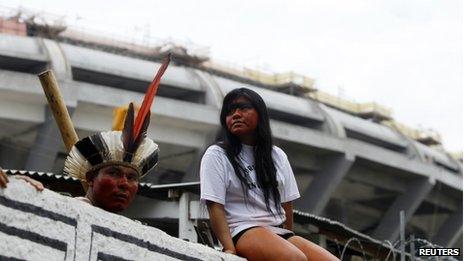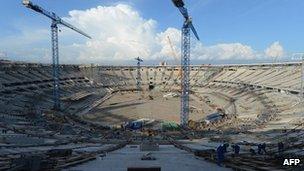Brazil: Maracana indigenous community delay World Cup eviction
- Published

A multi-storey car park is to be built on the site of the old Indigenous Museum
A Brazilian indigenous community that has been facing eviction from a building next to the Maracana football stadium has celebrated the police's decision to leave the area.
Riot police in Rio de Janeiro had encircled the area early on Saturday expecting a court order to evict them.
The building is meant to be demolished as part of preparations for next year's World Cup.
Community leaders said they were ready to fight back with bows and arrows.
Campaigners say the eviction and demolition of the historic building - Rio's former indigenous museum, built in 1862 - are unnecessary.
The community, known as Aldeia Maracana (or Maracana tribe), settled in the disused building six years ago.
'Tourist attraction'
Brazilian authorities say the area needs to be cleared for the circulation of fans during the 2014 World Cup.
Rio's governor Sergio Cabral recently said the demolition was being demanded by the Fifa, the international football federation.
But Fifa's office in Brazil issued a letter denying the claim, says the BBC's Julia Carneiro in Rio.
There are plans to build a car park in the area. A nearby state school is also due to be demolished, despite protests by parents.
Several matches will be played in Brazil's biggest and most famous stadium, including the World Cup final.
When it reopens, in the next few months, it will have a total capacity of 78,000 spectators.
Maracana will also host the opening and closing ceremonies of the 2016 Olympics.

Renovation work at the Maracana stadium is due to be completed early this year
The old Indigenous Museum, which belongs to the federal government, is in urgent need of repair. More than 20 families live there, planting traditional herbs and tobacco.
Campaign groups have tried to save it and keep the indigenous community where it has lived for the past six years.
The community hoped to be able to showcase their way of life to tourists during the World Cup.
Opposition legislator at the Rio de Janeiro Assembly Marcelo Freixo said tourists "would rather see a historic building next to the stadium than a car park or fast food joint".
A legal battle has been going on for months.
The local authorities have failed to get the court order, but campaigners expect the local authorities to continue pursuing the eviction in the next few days.
- Published1 December 2012
- Published17 December 2012
- Published17 August 2012